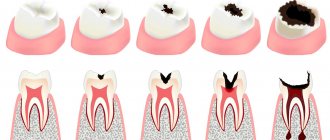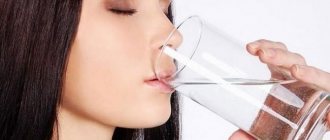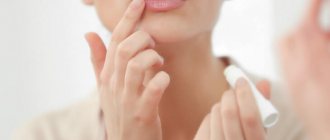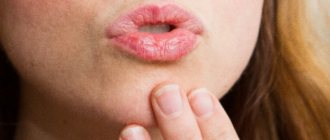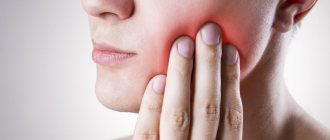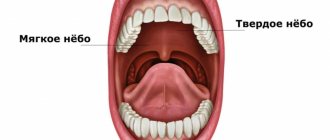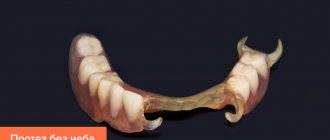A burn to the palate is one of the most common household injuries. Most often, children get it through negligence. Also at risk are adults who are accustomed to drinking and eating on the go due to a hectic schedule. In most cases, people get burns to the palate from boiling water (too hot tea, coffee, etc.) and food. Less commonly, injury is a consequence of contact of the mucous membrane with chemical compounds, aggressive components of medications and electric current.
A doctor should provide information on how to treat a burn to the palate of the mouth. A minor injury rarely requires specialist intervention; you can get rid of it yourself at home.
Clinical manifestations
Just one second is enough to damage the mucous membrane lining the oral cavity. Immediately after injury, symptoms of a palate burn appear. These include:
- feeling of unbearable burning sensation;
- edema;
- severe pain when touching the tongue;
- blisters;
- detachment of the mucous membrane;
- the presence of an unpleasant metallic taste in the mouth;
- pain while eating.
There are three degrees of palate burn:
- Characterized by mild symptoms. All clinical manifestations disappear on average within 4 days.
- The tissues become deformed and bleeding often develops. All this is accompanied by severe pain. Tissue restoration usually occurs after 2 weeks.
- Deep ulcers form on the mucous membrane, and the intoxication process progresses in the body. In this case, it is necessary to call an ambulance.
Burns can be thermal, chemical, electrical and radiation. In the latter case, we are talking about methods of treating the respiratory tract. If you do not follow the rules of procedures and their duration, the likelihood of damage to the mucous membrane increases significantly.
Treatment prognosis and possible consequences
The prognosis depends on the severity of the lesion and the speed of providing correct assistance at an early stage . If the burn is mild, the mucous membrane in the mouth will begin to heal after 4-5 days. If the damage is severe, then recovery will take 2-3 weeks and only if all the doctor’s recommendations are fully followed.
Third and fourth degree burns are fraught with complications:
- intoxication of the body,
- death (necrosis) of tissues,
- bleeding, suppuration in the mouth.
First aid
If you experience symptoms of a first or second degree injury, there is no need to panic. In such situations, you can do without medical intervention. But information on how to treat a third-degree burn of the palate in the mouth should be provided exclusively by a specialist (combustiologist or dentist).
If you receive an injury of any severity, you must provide first aid to yourself or the victim. The duration and success of treatment directly depends on the timeliness of these activities.
First aid algorithm:
- The wound must be disinfected. To do this, apply a cotton pad generously soaked in hydrogen peroxide to the palate.
- Take cold water into your mouth and hold it until it warms up. It is advisable to repeat this action until the burning sensation is completely relieved. Contrary to popular belief, it is strictly forbidden to use food as a cooling agent. This is fraught with infection.
Further actions directly depend on the type of burn. In case of thermal injury, you must take an analgin tablet. In case of a chemical burn, the affected area should be washed with a soda solution (1 tsp per 200 ml of warm water). If the mucous membrane is damaged by ammonia or alkali, it is necessary to rinse the oral cavity with a weak solution based on vinegar and water, prepared in a ratio of 1 to 7, respectively. If the injury is caused by medical or ethyl alcohol, you need to wash the lesion with an isotonic solution.
How to treat a burned tongue, palate, lips, throat in adults and children: medications, folk remedies
To make burns on the lips, palate, tongue and throat go away faster, use pharmaceutical products that have an antiseptic effect, accelerate healing and epithelization:
- Miramistin
- Chlorhexidine
- Dekasan (buy in nebulas and do inhalations)
- products with pantothenic acid
- hydrogen peroxide 3% (be sure to rinse your mouth with water after use)
A lip burn can be treated with Panthenol.
Also use folk remedies:
- rinse your mouth with cold decoctions of herbs - chamomile, oak bark, calendula
- apply propolis oil to burns
If the healing process is delayed, or you have a reaction to any of the medications used, consult a doctor.
Drug therapy for severe burns
During the appointment, the doctor examines you and tells you how to treat a burned palate. The classic treatment regimen consists of the following points:
- Rinse the mouth with Miramistin 6 times a day.
- Treatment of the lesion with Lidocaine. You need to lubricate the sky no more than once every 8 hours.
- Spraying the mucous membrane with Chlorophyllipt spray. Repeat the procedure up to 5 times a day.
- Treat the burn with Methyluracil 5 times a day.
- Taking medications containing retinol, vitamins E and C.
Additionally, your doctor may prescribe physiotherapeutic procedures. The most effective are UV irradiation and electrophoresis.
Symptoms
Symptoms of the problem largely depend on the cause of the inflammation. Pathologies of infectious, viral and fungal etiology manifest themselves in different ways.
Among the main signs characteristic of inflammation of the palate (regardless of the cause) are:
- pain of varying intensity;
- increase in the size of the sky;
- changes in the structure and color of the mucous membranes;
- discomfort while eating;
- rough palate syndrome.
Pain in the mouth is especially intense when infected with an infection. The lesions become red, swollen and inflamed
A significant increase in size of the area may indicate an allergic reaction. It occurs due to intolerance to food, medications or dental care products. Painful sensations are complemented by burning and itching. To relieve symptoms, it is recommended to take antihistamines.
Bleeding soft tissues indicate the introduction of bacterial flora into them. In this case, the symptom may be complemented by toothache.
Dangerous symptoms
Diseases that cause damage to the mucous structures of the mouth have a negative impact on overall health. Some symptoms should be a reason to see a doctor if the roof of your mouth hurts. The list of dangerous signs includes:
What to do if your cheek is swollen from a tooth
- loss of sensitivity of mucous structures;
- change in taste sensations;
- discomfort in the throat while swallowing (a symptom may indicate the development of a purulent sore throat);
- significant swelling of the mucous membranes;
- tooth decay;
- the presence of sores on the gums;
- seals with a modified structure, palpable on the tongue.
"Miramistin" for rinsing
Before treating a burn to the roof of your mouth, you need to make sure that it is first or second degree. As mentioned above, more serious injuries require medical attention.
Every first aid kit must have a drug such as Miramistin. This is a universal remedy that can help not only with burns. In addition, it is included in the treatment regimen for more serious mucosal damage.
Useful properties of "Miramistin":
- Anti-inflammatory. The active component stops the development of the pathological process and prevents the formation of exudate in the lesion.
- Healing. The process of tissue regeneration in burns is extremely long, the active substance helps to accelerate it.
- Antiseptic. The active component protects the mucous membrane, preventing infection.
Directions for use: point the nozzle at the sky and spray the product onto the burn twice. It is advisable to carry out the procedure after a meal.
Prevention measures
It's always easier to prevent a burn. This is a specific injury that leads to exfoliation and destruction of mucosal tissue in the mouth. It can be difficult even for doctors to immediately identify the depth and severity of the lesion.
More often than not, a burn to the palate is a simple carelessness caused by the consumption of hot foods and drinks. Prevention measures are simple:
- keep medicines, chemicals, hot foods away from children,
- explain how dangerous a burn from boiling water or hot food is and what consequences it can lead to.
The mucous membrane in the mouth is vulnerable and delicate, but quickly recovers if you approach therapy correctly and in a timely manner.
Treatment with dental gels
Currently, the pharmaceutical market offers many products that accelerate the healing of damaged mucosa. One of the most effective medications for burns is Asepta gel. This is the drug most often prescribed by dentists. It is intended for the treatment of the oral mucosa. The active component of the gel is propolis, which has a number of healing properties.
The drug "Asepta" must be applied in a thin layer to the damaged areas of the mucous membrane. Immediately before treatment, it is recommended to dry the pathology site with a cotton swab. This significantly accelerates the penetration of the active component into the tissue. The drug should be applied three times a day.
Many mothers are concerned about the question - how to treat a burn of the palate in the mouth of young children? Most drugs are not recommended for use in children. An exception is the Cholisal gel. This is a universal remedy that can relieve painful sensations in a short time. This is especially important, since after receiving a burn the child experiences severe discomfort while eating.
According to the instructions for use, the “Cholisal” dental gel should be squeezed onto a clean finger. The strip of the product should be 0.5 cm long. Then the drug must be carefully rubbed into the area of damage to the mucous membrane.
What not to do?
If you happen to get burned, you should know what actions you are prohibited from doing:
- Cool with cold foods such as ice cream or sodas. Otherwise, you can provoke irritation of the injured area, as well as increase the risk of wound infection.
- In case of a severe burn, it is forbidden to self-medicate with folk remedies. They will not bring the desired result and can be harmful to health. In this case, only a doctor can prescribe the necessary treatment.
To avoid burning your delicate oral cavity, you should exercise caution both at home and in public places. After all, one sip of a hot drink is enough to cause damage.
Rinsing the mouth with calendula tincture or decoction
The medicinal properties of the plant have long been recognized by traditional medicine. Calendula helps not only to eliminate painful sensations in a short time, but also to stop the inflammatory process.
If the palate is burned, adults are advised to rinse their mouths with a tincture based on this plant. To prepare, you need to take 100 g of pre-dried and crushed raw materials and pour it into a 0.5 liter jar. Fill the container with vodka without additives. Place the jar in a dark place for 2-3 days. Strain the resulting liquid. If you don’t have the time or desire to prepare the tincture yourself, you can purchase it at any pharmacy.
It is important to know that rinsing your mouth with undiluted product is unacceptable. This will inevitably provoke an even greater burn of the mucous membrane. How to dilute calendula for rinsing: add 1 tsp to 200 ml of water. tinctures, stir. Rinse your mouth with warm liquid as often as possible.
A decoction based on calendula is no less powerful. In addition, it can be used by children over three years of age. To prepare the decoction you need to take 1 tbsp. l. raw materials and fill it with 200 ml of water. Place the container on the fire. Cook for 10 minutes. After cooling, strain the product. Rinse your mouth as often as possible, preferably until the clinical manifestations disappear completely.
Causes of pain
Pain in the palate occurs due to external and internal factors. External causes include irritation of the oral mucosa by chemical and thermal factors. Minor microdamages lead to inflammation of the palate, as they create an ideal environment for the proliferation of pathogenic flora. Dentists identify several main causes of the problem.
Infections
The provoking factors of the problem include pathogens of fungal, viral and bacterial origin. There are pathogenic agents in the oral cavity of any person, but they are activated only under favorable conditions: a decrease in general and local immunity; metabolic disorders; chronic diseases.
The herpes virus affects not only the membranes of the palate, but also the mucous membranes of the entire oral cavity, including the lips. At the initial stage of the disease, the mucous membranes of the mouth become covered with red spots.
Fungal infection affects not only children, as many mistakenly believe, but also adult patients. The main symptoms of infection with yeast-like fungi are swelling of the soft tissues of the mouth and the appearance of a white coating on them.
The disease can develop secondarily as a result of infections of the ENT organs:
- tonsillitis;
- tonsillitis;
- inflammation of the tonsils.
The problems are complicated by secondary infection due to injury to the oral mucosa or poor hygiene.
Traumatic factors
The mucous membranes of the mouth are very thin, so hard and rough foods easily damage them. The same applies to cold and hot foods. The problem is often observed in adults and children who have the bad habit of biting their nails or putting foreign objects into their mouths. Violation of tissue integrity leads to the development of edema. The situation is complicated by poor oral hygiene.
Dental problems
Dental diseases that are not treated in a timely manner negatively affect the microflora of the mouth. In this case, gum inflammation is often accompanied by severe pain and swelling of the cheeks. The problem is caused by stomatitis, caries, dental cyst, periodontitis, osteomyelitis, pulpitis, periodontal disease.
Osteomyelitis is associated with inflammation of the deep layers of the gums and jaw structures, causing pain in the roof of the mouth
Why does the sky hurt? Other causes of palate damage include:
- Leukoplakia. The condition is considered an early stage of the oncological process. Leukoplakia occurs due to temperature irritants and injury to the mucous membranes.
- Smoking. Under the influence of nicotine and tobacco smoke, the structures of the mouth undergo changes. As a result, a person experiences pain in the upper palate of the mouth.
- Poor quality treatment. Complications occur with improper prosthetics or after the removal of teeth damaged by caries.
- Degenerative processes of bone structures. In this case, unpleasant sensations spread to the joints and jaw.
- Sialometaplasia is a benign tumor that affects the mucous membranes of the mouth. The tumor gradually enlarges and then ruptures, leaving behind a large bleeding wound.
Sea buckthorn oil against burns
This product has a number of useful properties. Sea buckthorn oil for burns helps relieve the inflammatory process and eliminate pain. In addition, the product has antimicrobial and biostimulating effects.
Sea buckthorn oil is used in almost all branches of medicine. This is due to its powerful healing properties. According to reviews, after using it, burn symptoms disappear after 2 days. To do this, you need to lubricate the affected area with a clean cotton pad three times a day.
Classification
There are several types of burns:
- Thermal. Formed by close contact with hot liquid, boiling water, or hot appliances.
- Electrical. Quite often they occur under the influence of a lightning strike or when working with technical equipment.
- Chemical burns. It can be obtained by contacting with acid, alkali and other chemicals.
- Sunny. Formed when the skin is damaged. Most often this happens on the beach while sunbathing or in a solarium under the influence of ultraviolet radiation. They are similar to thermal burns.
Preventive actions
Most often, dental diseases arise due to improper actions of the person himself. The problem is caused by thermal and chemical burns, as well as bad habits. Prevention of swelling of the soft tissues of the mouth includes:
- timely treatment of dental problems;
- avoidance of too hot and spicy foods;
- washing vegetables and fruits,
- refusal to consume crackers and chips;
- careful handling of chemicals;
- careful hygiene of the oral cavity, including the tongue;
- consumption of vitamins during the off-season;
- prevention of infection of the oral mucosa.
Parents should have a preventive conversation with their children about not sharing bottles, utensils, etc. with other people. At the first signs of inflammation, you should consult a dentist or use antiseptic mouthwash and treat the affected areas. To prevent inflammatory processes in the oral cavity, you need to monitor the condition of your teeth and gums. If all preventive rules are followed, infection of the body can be prevented.
